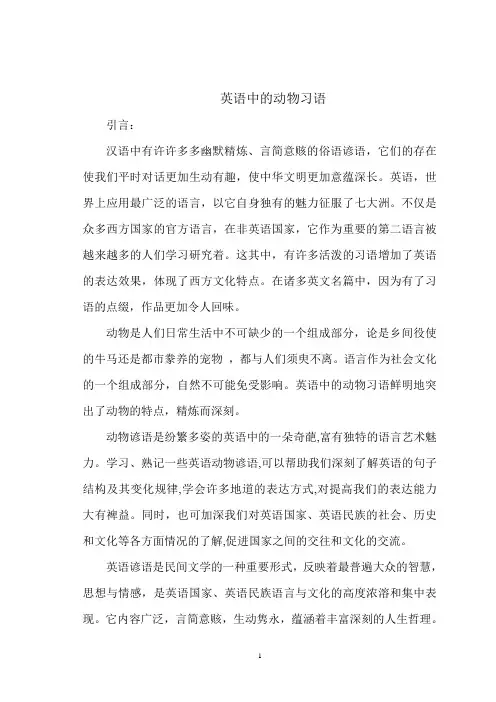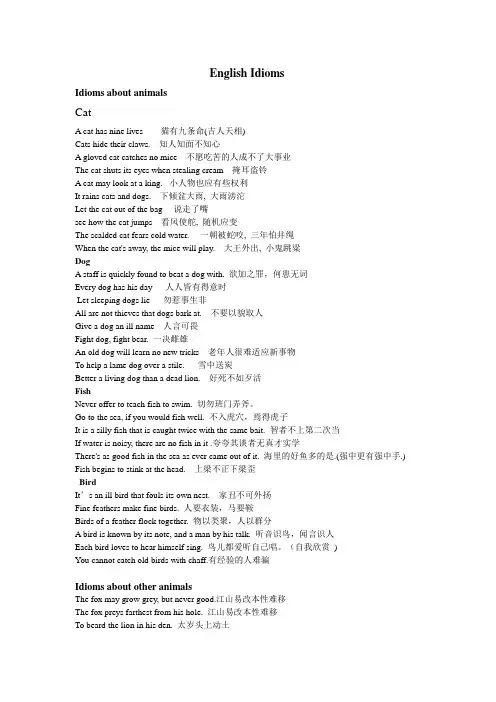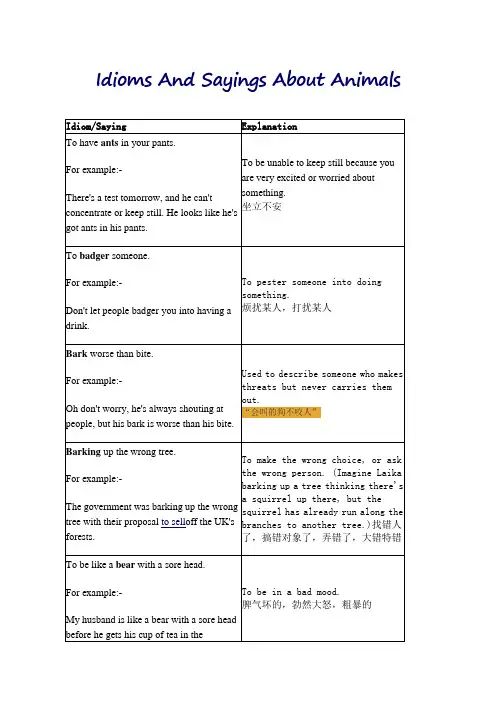Animal Idioms动物习语教程文件
英语习语典故趣谈1

2. a pig in a poke poke在这儿解释为口袋。中世纪的英国, 有许多不法分子在繁荣的市集中行骗。卖 猪的贩子,通常只会摆一只小猪在架上, 当做样品让来往的客人看,其他的猪只则 装在袋中,购买时一手交钱,一手交袋。 通常客人购买时,都不会打开袋子检查里 面的物品,而是买了就走,直到回了家, 才发现里面装的原来是野猫。
4. Bark up the wrong tree 做事、看人,首先得找定目标。找目标很伤脑筋, 找错目标更伤脑筋。汉语中,我们常戏谑看走 眼的“他”:“找错人了”;英语中相应的说 法是:He is barking up the wrong tree。 据记载,该短语源于17世纪美国殖民地时期。当时 的美洲人烟稀少,开发西部的拓荒者靠打猎为 生。狩猎自然需要猎狗,不过,聪明的猎狗有 时也会被猎物耍弄。比如,浣熊常常昼眠夜出, 黑暗中它会误导猎狗,让其误以为自己躲在已 经空了的树洞里。结果,猎狗对着错误的目标 狂吠不已(to bark up the wrong tree)。随着时间 的推移,“to bark up the wrong tree”逐渐被公 众所接受,借喻“精力或目标集中在错误的地 方”。
只吃一餐,营养摄取不够。 If you think I can come up with more money, you're barking up the wrong tree. 如果你指望我拿出更多的钱,那你找错人了。
5. bell the cat bell the cat源自一个故事:有一窝老鼠,因为怕 猫,不敢出去找食物。其中有一只老鼠想了一 个办法,在猫的脖子上套一个铃铛,这样,他 们就可以知道猫在哪里,然后避开它找食物。 这个办法得到全体老鼠的一致拥护,但有一个 最重要的问题尚未解决:谁去给猫套铃铛呢? 也就是:Who will bell the cat? 这个故事的结局 怎样,没有明确的说法,但bell the cat这个短语 却被人们反复引用,意思是“为了大家的利益 承担风险”。
英语中的动物习语概要

2.cat’s 猫爪
paw
这条习语源自拉· 封丹的寓言故事《猴
子与猫》:一只猴子想吃火中烤熟的栗 子,又怕烫伤自己的手,就叫猫用爪从火 中取栗子。偷出的栗子都让猴子吃了, 而猫却把自己爪子上的毛烧掉了。这 条习语用来比喻“被人当爪牙利用的 人,受人愚弄的人”。
3. to rain cats and dogs 意思为滂沱大雨.西方人认为帽可以预测天气变 化,所以帽被看成大雨的象征.而狗是风的使者, 所以两者相遇时可以想象. 4. curiosity killed the cat 译为不要太过好奇.猫有一个很危险的习惯-用 鼻子接触所有的东西,如同过于热心的人容易引 起别人的反感. Children are usually warned that curiosity killed the cat.
3. Barking dogs seldom bite. 吠犬不咬人(意指:对于高声发出恐吓,或惯 于大声吼叫的人,勿须当真)。 4. Dumb dogs are dangerous. 不叫的狗咬人 5. Dog does not eat dog. 同类不相残;同室不操戈。 6. a cat-and-dog life 争争吵吵的日子 7. Give a dog a bad name and hang him. 谗言可畏,欲加之罪,何患无辞
2.Every
dog has his day 每条狗都有自己的日子 该习语源自莎士比亚名剧《哈姆雷特》 第五幕第一场的台词: Let Hercules himself do what he may, That cat will mew, and all dog will have his day. 现在此习语比喻“人人皆有得意之日”
Idioms About Animals

Match work (P9)
Early to bed and early to rise before they are hatched Catches the worm is a penny saved Actions speak louder than words All work and no play the early bird Makes jack a dull boy there is a way Makes a man healthy, wealthy and wise a penny saved Crying over spilt milk don’t count your chickens Where there is a will it’s no use
Questions: 1.Whats the longest word in the world? 2.Where can a dog get another tail? 3.Why does time fly?
4. Why are dogs afraid to sunbathe?
1.Smiles. Because there’s a mile between the letter “s”. 2. At a retail store. 3. To get away from all those who are trying to kill it. 4. They don't want to be hot-dogs.
Speak of angels and you hear their songs. First thing first Eat or west, home is best. One is never too old to learn. A man who neglects his studies in youth will regret it in later years. One man’s meat is another man’s poison. Don’t put all your eggs in one basket. After dinner, rest while, after supper, walk a mile Strike while the iron is hot. A thousand miles trip begins with one step. One's life is limited ,but learning is endless . Penny wise, pound foolish.
英语动物习语

英语中的动物习语引言:汉语中有许许多多幽默精炼、言简意赅的俗语谚语,它们的存在使我们平时对话更加生动有趣,使中华文明更加意蕴深长。
英语,世界上应用最广泛的语言,以它自身独有的魅力征服了七大洲。
不仅是众多西方国家的官方语言,在非英语国家,它作为重要的第二语言被越来越多的人们学习研究着。
这其中,有许多活泼的习语增加了英语的表达效果,体现了西方文化特点。
在诸多英文名篇中,因为有了习语的点缀,作品更加令人回味。
动物是人们日常生活中不可缺少的一个组成部分,论是乡间役使的牛马还是都市豢养的宠物,都与人们须臾不离。
语言作为社会文化的一个组成部分,自然不可能免受影响。
英语中的动物习语鲜明地突出了动物的特点,精炼而深刻。
动物谚语是纷繁多姿的英语中的一朵奇葩,富有独特的语言艺术魅力。
学习、熟记一些英语动物谚语,可以帮助我们深刻了解英语的句子结构及其变化规律,学会许多地道的表达方式,对提高我们的表达能力大有裨益。
同时,也可加深我们对英语国家、英语民族的社会、历史和文化等各方面情况的了解,促进国家之间的交往和文化的交流。
英语谚语是民间文学的一种重要形式,反映着最普遍大众的智慧,思想与情感,是英语国家、英语民族语言与文化的高度浓溶和集中表现。
它内容广泛,言简意赅,生动隽永,蕴涵着丰富深刻的人生哲理。
谚语来源于生活,更贴近民众,而与大众生活密切相关的动物,也成为谚语的素材。
英语谚语中与动物相关的例子不胜枚举,现撷取几条与大家共赏。
第一讲:动物习语分类展示(一)1.Bird(1) Kill two birds with one stone. 一箭双雕;一举两得。
(2) A bird in the hand is worth two in the bush. 双鸟在林不如一鸟在手。
(3) Birds of a feather flock together. 物以类聚,人以群分。
(4) It’s an ill bird that fouls own nest. 家丑不可外扬。
English idioms英语习语

English IdiomsIdioms about animalsCatA cat has nine lives 猫有九条命(吉人天相)Cats hide their claws. 知人知面不知心A gloved cat catches no mice 不愿吃苦的人成不了大事业The cat shuts its eyes when stealing cream 掩耳盗铃A cat may look at a king. 小人物也应有些权利It rains cats and dogs. 下倾盆大雨, 大雨滂沱Let the cat out of the bag 说走了嘴see how the cat jumps 看风使舵, 随机应变The scalded cat fears cold water. 一朝被蛇咬, 三年怕井绳When the cat's away, the mice will play. 大王外出, 小鬼跳粱DogA staff is quickly found to beat a dog with. 欲加之罪,何患无词Every dog has his day 人人皆有得意时Let sleeping dogs lie 勿惹事生非All are not thieves that dogs bark at. 不要以貌取人Give a dog an ill name 人言可畏Fight dog, fight bear. 一决雌雄An old dog will learn no new tricks 老年人很难适应新事物To help a lame dog over a stile. 雪中送炭Better a living dog than a dead lion. 好死不如歹活FishNever offer to teach fish to swim. 切勿班门弄斧。
Go to the sea, if you would fish well. 不入虎穴,焉得虎子It is a silly fish that is caught twice with the same bait. 智者不上第二次当If water is noisy, there are no fish in it .夸夸其谈者无真才实学There's as good fish in the sea as ever came out of it. 海里的好鱼多的是.(强中更有强中手.) Fish begins to stink at the head.上梁不正下梁歪BirdIt’s an ill bird that fouls its own nest.家丑不可外扬Fine feathers make fine birds. 人要衣装,马要鞍Birds of a feather flock together. 物以类聚,人以群分A bird is known by its note, and a man by his talk. 听音识鸟,闻言识人Each bird loves to hear himself sing. 鸟儿都爱听自己唱。
英语习语English idioms and funny expressions-动物篇

Idioms And Sayings About AnimalsIdiom/Saying ExplanationTo have ants in your pants.For example:-There's a test tomorrow, and he can't concentrate or keep still. He looks like he's got ants in his pants. To be unable to keep still because you are very excited or worried about something.坐立不安To badger someone.For example:-Don't let people badger you into having a drink. To pester someone into doing something.烦扰某人,打扰某人Bark worse than bite.For example:-Oh don't worry, he's always shouting at people, but his bark is worse than his bite. Used to describe someone who makes threats but never carries them out.“会叫的狗不咬人”Barking up the wrong tree.For example:-The government was barking up the wrong tree with their proposal to sell off the UK's forests. To make the wrong choice, or ask the wrong person. (Imagine Laika barking up a tree thinking there's a squirrel up there, but the squirrel has already run along the branches to another tree.)找错人了,搞错对象了,弄错了,大错特错To be like a bear with a sore head.For example:-My husband is like a bear with a sore head before he gets his cup of tea in the To be in a bad mood.脾气坏的,勃然大怒,粗暴的morning.To have a bee in your bonnet. For example:-She's got a real bee in her bonnet about that new advertising campaign, she's evenphoned the ACA! To be obsessed about something你不能停止、没完没了地想这件事儿。
与动物相关的英语习语学习研究word资料6页
与动物相关的英语习语学习研究英语学习简单中见复杂,习语的学习就是最好的解答,看似简单的动物词汇,在习语中却呈现出不同的意境,对于初中学生来说,如果能加强习语的学习,对于听力、阅读理解将会有着重要的作用。
习语是文化的载体,又是语言的精华。
习语通常包括俚语、俗语、谚语等。
其表现形式音节优美,音律协调,或含蓄幽默,或严肃典雅,形象生动,给人一种美的享受。
一个人,特别是一个说外国语时使用习语的人,人们会记住不忘!因为一个好的习语比几十个普通词汇更令人难以忘记!而英语作为全世界通用语言,有着种类繁多的习语,在英语的许多习语中都包含了大量的动物词汇在里面,如:狗、猫等。
在了解英语习语的同时也增添了学习的趣味性,那么就从我最喜欢的“狗”来开始我们的“动物之旅”吧!1、dog――狗狗是所谓的“人类最好的朋友”,这就是为什么许多西方人拒绝进食,所以西方人对狗有极其哀怜的情感,在很多习语中也用dog来表达:You are a lucky dog.你真幸运,to help a lame dog over a stile助人于危难;Better be the head of a dog than the tail of a lion.宁为鸡头,勿为牛后。
2、cat――猫猫在中国人眼里总是跟温顺可爱联系在一起。
在西方国家,猫有了多种喻义:邪恶、自由、生命力等。
同样的,猫在英语习语里也表达着不同的含义,如谚语:cat out of the bag.泄漏天机,The cat shuts its eyeswhen stealing.掩耳盗铃;A cat has nine lives.猫有九命。
3、鸟鸟对人类的贡献是众所周知的。
而在英语习语中,“鸟”这个词同样起着不可或缺的作用,下面的几个常见的习语就说明了这一点:Birds of a feather flock together.物以类聚,人以群分;Fine feathers make fine birds.人要衣装,马要鞍;The early bird catches the worm.捷足先登;其他一些用bird来表达的习惯用语还有:eat like a bird食量小;a home bird 喜欢呆在家里的人;Songbird女歌唱家等等。
animal idioms
Animal idioms
Dog
in the doghouse (在狗窝里)-表示某人自愿受罚 a cat-and-dog life 争争吵吵的日子 lead a dog's life 过着牛马不如的生活 go to the dogs 每况愈下 hang-dog look 愁眉苦脸 not have a dog's chance 毫无机会 come like a dog at a whistle 一呼即来 teach an old dog new tricks 使守旧的人接受新事物 teach the dog to bark 教狗怎么叫(意指多此一举)
Horse
马
You can take a horse to the water, but you can't make him drink. 策马溪边易,逼马饮水难. A horse may stumble on four feet. 人有失足,马有漏蹄. A running horse needs no spur. 奔马无须鞭策. Don't put the cart before the horse. 不要把车套在马前.(不要本末倒置.) Hair by hair you will pull out the horse's tail. 一根一根拔,拔光马尾巴.(水滴石穿.) Lock the barn door after the horse is stolen. 失马之后锁马厩.(亡羊补牢.) work like a horse 埋头苦干 eat like a horse 狼吞虎咽 as strong as a horse 健壮如牛
Cat
猫
On the Translation of English Idioms of Animal
关于动物习语的翻译On the Translation of English Idioms of AnimalAbstract:Animal idioms play an important role in both English and Chinese for their abundant figurative images, distinctive functions and their expressiveness.The similarities and dissimilarities of figurative images between Englishand Chinese animal idioms reflect the dual nature of human cultureevolution. This article probes into its reasons of the dissimilarities fromdifferent living conditions, different religions, customs and loanwords.Thus it draws a conclusion that we should pay more attention to theimplied cultural information when we transmit language information incross-cultural communication. So, only when we have a good grasp ofdifferent cultural origins of both nations and pay more attention to twonoticeable problems that are: never use heavily nation-colored terms andnever assume the meaning of English idioms from the linguistic level canwe translate the idioms in a proper way.Key words: animal idioms; figurative images; cultural dissimilarity; translation摘要: 动物习语以其丰富的比喻形象,独特的作用和表现力,在英汉两种语言中都占有一席之地。
与动物有关的习语Idiomsaboutanimals…………
1与动物有关的习语 Idioms about animals ………………………1 狗 dog………………………………………………………………2 猫 cat………………………………………………………………4 马 horse……………………………………………………………6 鱼 fish ……………………………………………………………72一、与动物有关的习语在英语中,许多与动物相关的习语很有意思。
西方文学喜欢 借动物来隐喻人类。
例如:Love me, love my dog.字面义:爱我,也爱我的狗。
翻译为: 爱屋及乌。
Pigs might fly.字面义:猪可能会飞。
翻译为:奇迹可能发生。
shed crocodile’s tears字面义:鳄鱼眼泪 翻译为:假慈悲1 狗 dog狗是一种大家都十分熟悉的动物,由于中英两国人民对狗的 喜好程度不一,因此,狗在中英两国的地位是不一样的。
欧洲人 民以渔猎、游牧为主,狗成为了重要的劳动工具和生产工具,于 是就出现了猎犬、牧羊犬。
狗对于英国人来说,即可以用来看门 或打猎,也可视作人的伴侣和爱物。
因此,英国人对狗不但没有 厌恶感,反而有爱怜之情。
于是,在英语中就有许多含有褒义的 有关狗的习语。
The dog is men’s best friend.狗是人类最好的朋友。
2Love me, love my dog.爱屋及乌。
Every dog has his day.人人皆有得意时。
You are a lucky dog.你是一个幸运儿。
the top dog 优胜者Do you know? A dog has a good nose. 狗的嗅觉很灵敏。
But it can’t see colours. 但是狗不会辨认颜色。
3 猫 cat A cat has nine lives.猫有九条命。
(意为生命力强)When the cat is away, the mice will play.猫儿不在,老鼠翻天。
- 1、下载文档前请自行甄别文档内容的完整性,平台不提供额外的编辑、内容补充、找答案等附加服务。
- 2、"仅部分预览"的文档,不可在线预览部分如存在完整性等问题,可反馈申请退款(可完整预览的文档不适用该条件!)。
- 3、如文档侵犯您的权益,请联系客服反馈,我们会尽快为您处理(人工客服工作时间:9:00-18:30)。
Differences of connotations
Chinese
English
• 噤若寒蝉(cricket) • 热锅上的蚂蚁(ant) • 吹牛(cattle) • 落汤鸡(chick) • 瓮中之鳖(turtle) • 鸡皮疙瘩(chicken)
• as mute as fish • like a cat on hot bricks • talk horse • goose flesh • a rat in a hole • wet as a drowned rat
• 3. Hen • hen-party 女人聚会,
• She has invited all her girlfriends to a hen-party on Friday night.
• hen-pecked 惧内的,
• He’s hen-pecked from morning to night. • like a hen with one (only) chicken 大惊
in English stands for
Similar Attitudes Towards The
Same Animal
Both English and Chinese have the same attitude towards animals. They both compare “parrot ”to “imitate”, compare “pig” to “greedy” or “dirty”, compare “peacock” to “proud” , compare “ass” to “foolish” ,compare“wolf” to “cruel” ,“lamb ”to“innocent”,“bird” to“ free”.
• (4) Fine feathers make fine birds. 人要衣装, 马要鞍。
• (5) A bird is known by its note, and a man by his talk. 听音识鸟,闻言识人。
• (6) Each bird loves to hear himself sing. 鸟 儿都爱听自己唱。(自我欣赏)
English Chinese
• as sly as a fox • as fat as a pig • as slow as snail • as cruel as a wolf
• 像狐狸一样狡猾 • 肥得像猪 • 像蜗牛一样慢 • 像狼一样残忍
The reasons why different animal words have the similar cultural meaning
Animal Idioms are very common in our daily life . They enrich our English verbal communications . So now , let us introduce them for you.
Similarities of connotations
Examples
• 1.Bird
• (1) Kill two birds with one stone. 一箭双雕; 一举两得。
• (2) A bird in the hand is worth two in the bush. 双鸟在林不如一鸟在手。
• (3) Birds of a feather flock together. 物以类 聚,人以群分。
• 2. Cat
• (1) A cat has nine lives.猫有九条命;(吉人 天相)
• (2) Cats hide their claws. 知人知面不知心。
• (3) Who will bell the cat? 谁去给猫系铃? (谁愿意为大家冒风险?)
• (4) The cat shuts its eyes when stealing cream. 猫偷吃奶油的时候总是闭着眼睛。 (掩耳盗铃)
Reasons causing cultural connotation differences
1.Different geography
2.Different customs
3.Influence of historical allusion
4.Influence of religion
Different Thoughts Between Chinese and
English
• “Dragon” is a divine totem in the Chinese culture, and is greatly admired by the Chinese people and they consider themselves as the descendants of the dragon. Dragon is the symbol of all auspicious animals.
• In English the word “dragon”
symbolizes evil. Such as: “the old dragon”, “dragon’s teeth”.
Chinese people take “owl” as a symbol
of bad luck. But in the UK, there is “as wise as an owl”. “owl”
Animal Idioms动物习语
Introduction
Idiom is a fixed group of words or a single word, or even a sentence with a special meaning that cannot be guessed from the literal meaning of its components. “Language is the carrier container of culture, and is strongly influenced and shaped by culture.
